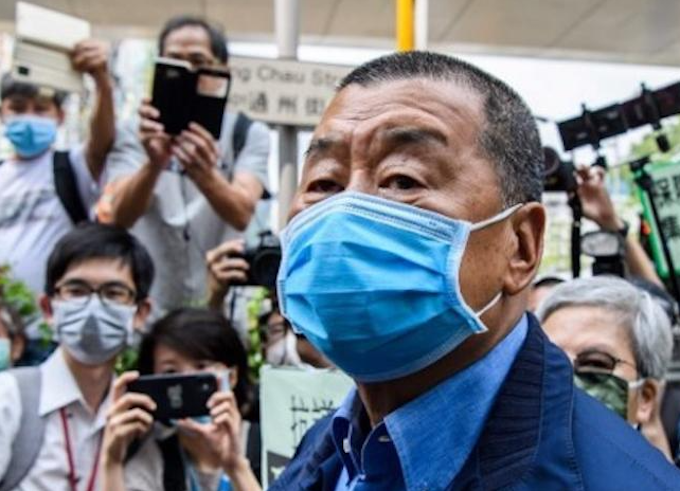
Pacific Media Watch Newsdesk
The Paris-based Reporters Without Borders global media freedom watchdog has denounced the arrest of Jimmy Lai, the founder of Hong Kong’s pro-democracy newspaper Apple Daily.
Lai, 71, was arrested at his home residence on the morning of August 10, 2020, accused of “colluding with foreign forces”.
Lai’s two sons and at least seven other members of his team were also arrested.
READ MORE: Jimmy Lai arrested – Freedom loses again in Hong Kong
According to the new National Security Law imposed on June 30 by the Chinese regime, Lai risks life imprisonment if put on trial in Hong Kong, and may even face the death penalty if the trial takes place in the People’s Republic of China (PRC), which the law does not exclude.
Simultaneously, 200 police officers raided Apple Daily’s headquarters, blocking its journalists from entering the newsroom and obstructing several other major news outlets from covering the incident including Associated Press (AP), Agence France-Presse (AFP), Reuters, Hong Kong public broadcaster RTHK, and local media Initium, In-media and Stand News.
“By charging Apple Daily’s founder with ‘colluding with foreign forces’, the Hong Kong government clearly seeks to take down a symbolic figure of press freedom”, said Christophe Deloire, Reporters Without Borders (RSF) Secretary General, who urges that “all charges to be dropped and all defendants immediately released”.
Coverage of pro-democracy protests
Next Digital (formerly Next Media), the parent company of Apple Daily, is one of the few remaining Hong Kong media groups openly critical of the Chinese regime and provided extensive coverage of last year’s pro-democracy protests.
Lai has since been arrested on two occasions for criminal intimidation and organising and participating in unauthorised demonstrations.
In addition, two websites publicising the personal information of Apple Daily journalists with malicious intent that were previously blocked for doxing, made a brief reappearance online in early August.
The National Security Law allows the Chinese regime to directly intervene in the special administrative region of Hong Kong so as to suppress, with the appearance of legality, anything it deems to be “terrorism”, “secession”, “subversion” or “collusion with foreign forces”.
The vast majority of the 115 journalists currently detained in China are imprisoned under allegations of a similar nature.
Hong Kong, once a bastion of press freedom, has fallen from 18th place in 2002 to 80th place in the 2020 RSF World Press Freedom Index.
The People’s Republic of China, for its part, stagnates in 177th place out of 180 countries.
The Pacific Media Centre’s Pacific Media Watch media freedom project collaborates with Reporters Without Borders.













































